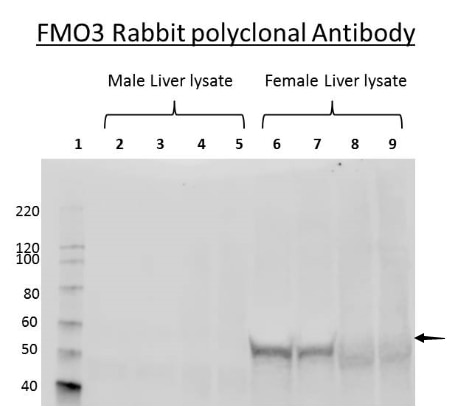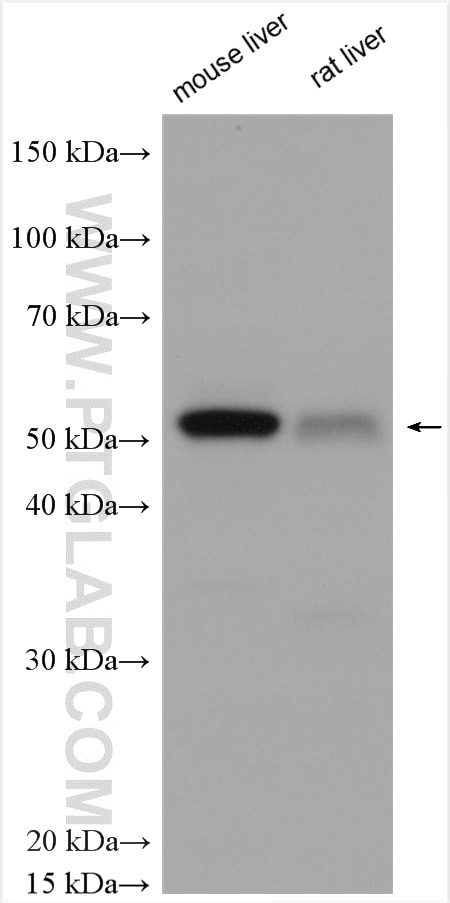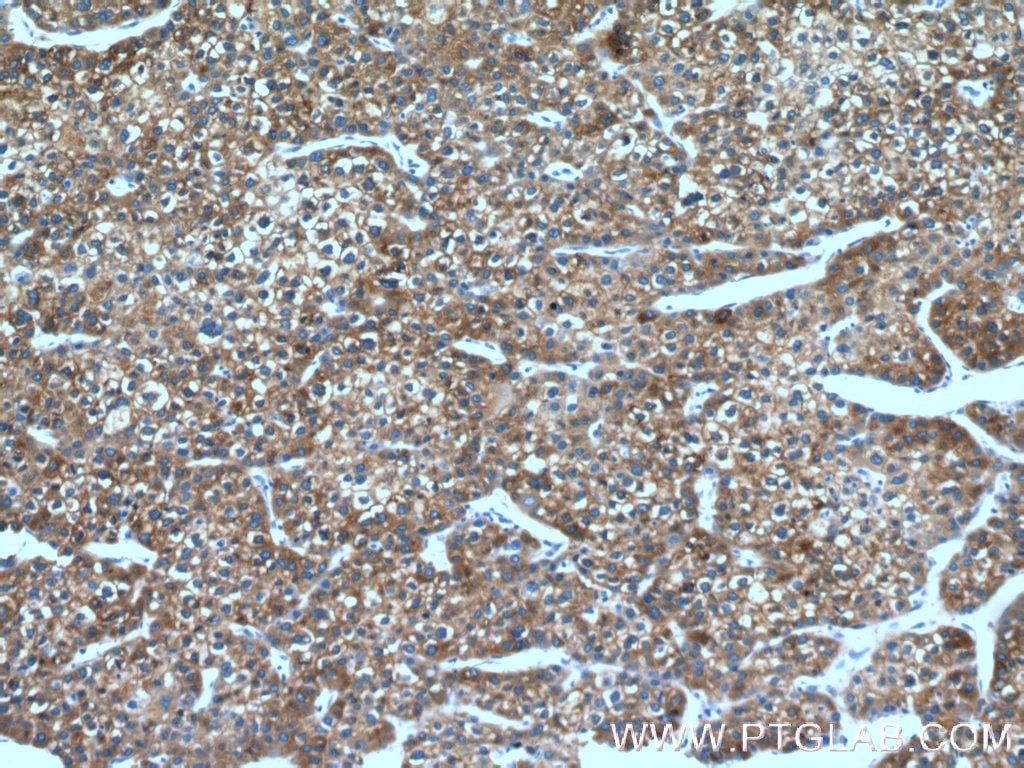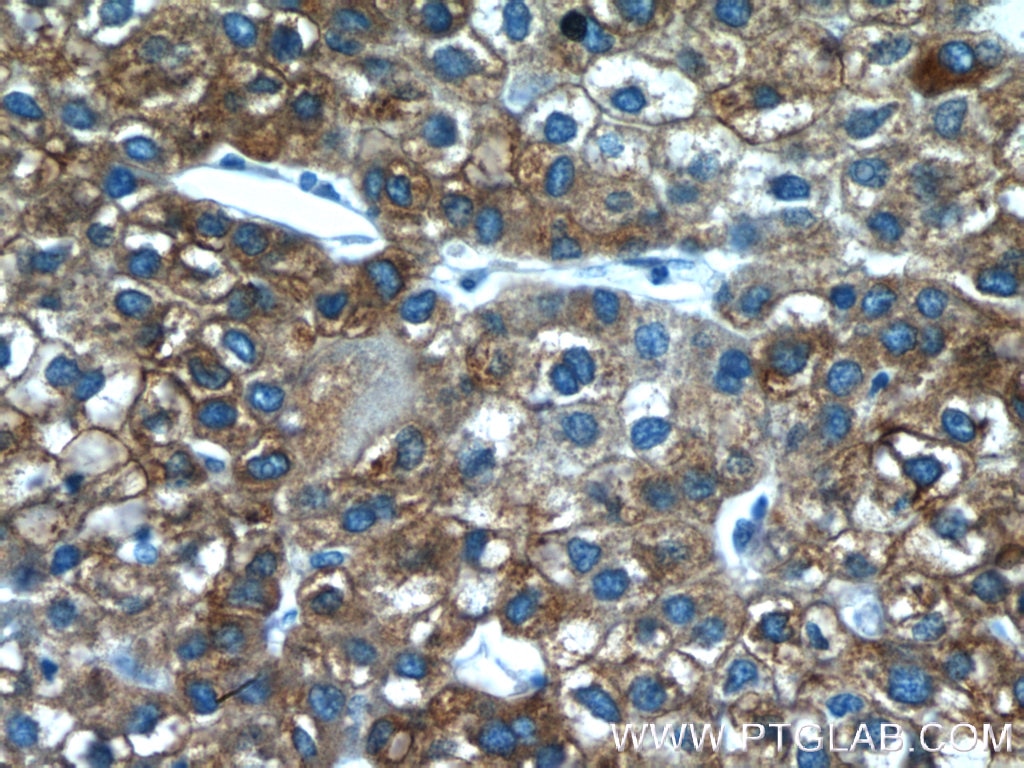Tested Applications
| Positive WB detected in | mouse liver tissue, rat liver tissue |
| Positive IHC detected in | human liver cancer tissue Note: suggested antigen retrieval with TE buffer pH 9.0; (*) Alternatively, antigen retrieval may be performed with citrate buffer pH 6.0 |
Recommended dilution
| Application | Dilution |
|---|---|
| Western Blot (WB) | WB : 1:100-1:500 |
| Immunohistochemistry (IHC) | IHC : 1:50-1:500 |
| It is recommended that this reagent should be titrated in each testing system to obtain optimal results. | |
| Sample-dependent, Check data in validation data gallery. | |
Published Applications
| WB | See 8 publications below |
| IHC | See 2 publications below |
Product Information
17469-1-AP targets FMO3 in WB, IHC, ELISA applications and shows reactivity with human, mouse, rat samples.
| Tested Reactivity | human, mouse, rat |
| Cited Reactivity | human, mouse, rat |
| Host / Isotype | Rabbit / IgG |
| Class | Polyclonal |
| Type | Antibody |
| Immunogen |
CatNo: Ag11405 Product name: Recombinant human FMO3 protein Source: e coli.-derived, PET28a Tag: 6*His Domain: 27-351 aa of BC032016 Sequence: EPTCFEKSNDIGGLWKFSDHAEEGRASIYKSVFSNSSKEMMCFPDFPFPDDFPNFMHNSKIQEYIIAFAKEKNLLKYIQFKTFVSSVNKHPDFATTGQWDVTTERDGKKESAVFDAVMVCSGHHVYPNLPKESFPGLNHFKGKCFHSRDYKEPGVFNGKRVLVVGLGNSGCDIATELSRTAEQVMISSRSGSWVMSRVWDNGYPWDMLLVTRFGTFLKNNLPTAISDWLYMKQMNARFKHENYGLMPLNGVLRKEPVFNDELPASILCGIVSVKPNVKEFTETSAIFEDGTIFEGIDCVIFATGYSFAYPFLDESIIKSRNNEII Predict reactive species |
| Full Name | flavin containing monooxygenase 3 |
| Calculated Molecular Weight | 532 aa, 60 kDa |
| Observed Molecular Weight | 60 kDa |
| GenBank Accession Number | BC032016 |
| Gene Symbol | FMO3 |
| Gene ID (NCBI) | 2328 |
| RRID | AB_2878410 |
| Conjugate | Unconjugated |
| Form | Liquid |
| Purification Method | Antigen affinity purification |
| UNIPROT ID | P31513 |
| Storage Buffer | PBS with 0.02% sodium azide and 50% glycerol, pH 7.3. |
| Storage Conditions | Store at -20°C. Stable for one year after shipment. Aliquoting is unnecessary for -20oC storage. 20ul sizes contain 0.1% BSA. |
Background Information
Microsomal flavin-containing monooxygenase (FMO) catalyzes the FAD-, NADPH-, and O2-dependent oxidation of a large number of xenobiotics containing soft nucleophiles,including alkaloids, pesticides, and pharmaceutical substances.Based on the cDNA sequence, the FMOs are classified into five subfamilies (FMO1 to FMO5) (PMID:11792679).In human beings, FMO3 is predominant in the adult liver, but not appear sex-dependent in the adult human liver. In the mouse liver, its expression has been shown to be sex-dependent and expressed only in females (PMID:11996886). Defects in FMO3 are the cause of trimethylaminuria (TMAU). This antibody is specific to FMO3.
Protocols
| Product Specific Protocols | |
|---|---|
| IHC protocol for FMO3 antibody 17469-1-AP | Download protocol |
| WB protocol for FMO3 antibody 17469-1-AP | Download protocol |
| Standard Protocols | |
|---|---|
| Click here to view our Standard Protocols |
Publications
| Species | Application | Title |
|---|---|---|
J Hazard Mater Dietary titanium dioxide particles (E171) promote diet-induced atherosclerosis through reprogramming gut microbiota-mediated choline metabolism in APOE-/- mice. | ||
EBioMedicine Akkermansia muciniphila prevents cold-related atrial fibrillation in rats by modulation of TMAO induced cardiac pyroptosis. | ||
Front Microbiol Berberine Improves Vascular Dysfunction by Inhibiting Trimethylamine-N-oxide via Regulating the Gut Microbiota in Angiotensin II-Induced Hypertensive Mice. | ||
Food Sci Biotechnol Effects of black raspberry extract on gut microbiota, microbial metabolites, and expressions of the genes involved in cholesterol and bile acid metabolisms in rats fed excessive choline with a high-fat diet | ||
Int J Biochem Cell Biol Deciphering the diurnal rhythm regulating mechanism of flavin-containing monooxygenase 3 in mouse liver | ||
ACS Pharmacol Transl Sci In Vivo and In Vitro Pharmacokinetic Studies of a Dual Topoisomerase I/II Inhibitor |










